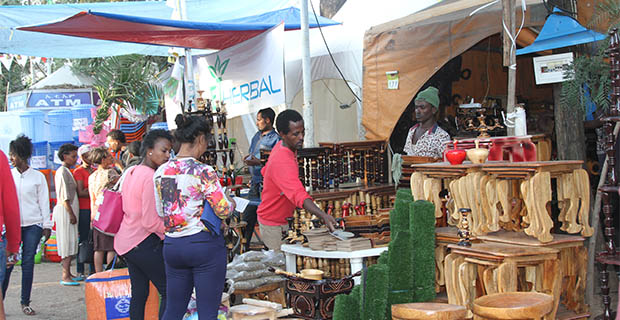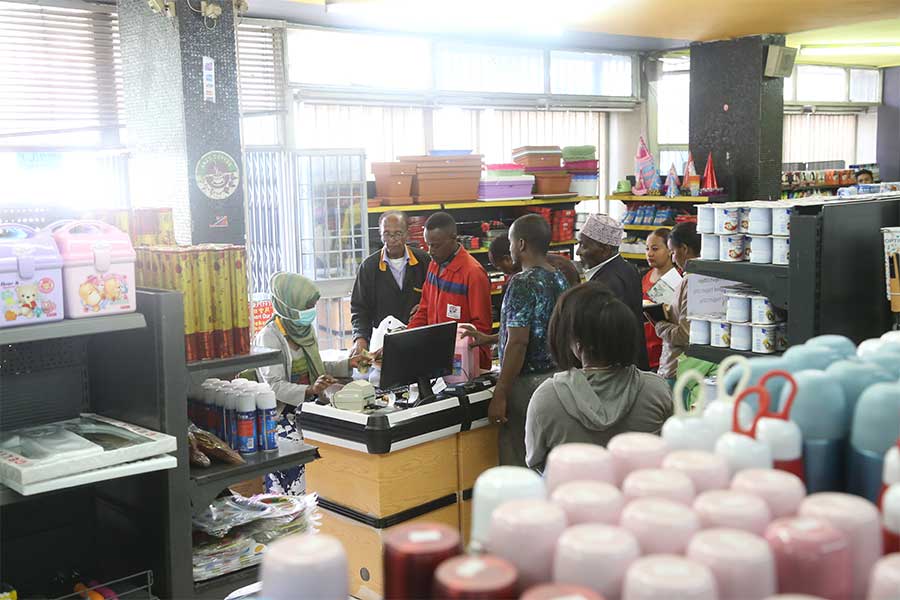
Fortune News | Oct 30,2021
Fikre Seifu, a resident of Adama, received a phone call in the early morning hours of October 22, 2019. The call was from friends who told him that his shop had been set on fire.
A father of one, Fikre, in his early 30s, headed to the shop he had rented at a commercial building. As the revenue he gets from the shop, where he sells clothing, is his chief source of income, he was shocked by the news. Half an hour later, he found out that the business he had been running for seven years was no more.
“I lost about 750,000 Br of property,” Fikre told Fortunewith tears in his eyes.
He also lost 50,000 Br in cash, which was in his shop after he received it from a friend.
Fikre’s shop was not the only one damaged by the unrest that engulfed the city for at least two days. Around 30 shops and their property, worth an estimated 22.5 million Br, were damaged, according to the shop’s owners.
It was not only shops that fell prey to the politically motivated instability. Vehicles, churches and buildings, as well as factories, were damaged. Africa Flour Factory, one of 109 registered companies that manufacture wheat flour, was one of them.
Established in 1997 on a 13,000Sqm plot of land, the plant has a capital of 144 million Br and operates with 800 employees. It manufactures flour and pasta. During the unrest, 30 of its trucks were attacked. Fourteen of these, estimated at 15.5 million Br, were completely damaged.
The factory also lost 25 offices and finished pasta products that were ready for shipping. Ten employees of the factory were also injured, while one died.
“When the mobs of youth came to the factory, we called kebeleofficials and the police station, but the former didn’t answer our call,” said Begashaw Gedele, administrator of the plant that stopped operating for ten consecutive days after the incident. “I believe that if the police had reached the plant in time, the damage would have been minimised.”
The widespread unrest in the city has led to large and small companies putting their business on hold while things cool down. This was the choice taken by owners of Brothers Flour & Biscuit Factory, located next to Africa flour factory.
Close to 30 shops with inventories worth an estimated 22.5 million Br, were damaged during the unrest that arose in Adama, Oromia Regional State.
The factory, which manufactures wheat flour and biscuits, did not incur massive damage other than broken windows.
“The damage would have been serious had the local people not been protecting our property,” said Gossa Tedela, administration service director of the factory that employs 2,000 people and paid 12 million Br in taxes in the last fiscal year.
The factory used to run 24 hours a day but has since suspended operations.
“We don’t have any guarantee the same incident will not happen again,” says Gossa, explaining why the factory remains closed. “We are paying salaries without operating.”
Officials of the Adama City Administration nonetheless insist that there is no reason to remain closed as the unrest has calmed down.
“The city has returned to its normal state, and there is no reason for the residents to be scared anymore,” said Ubad Juna, security chief of the Adama City Administration, who adds that the extent of the damage is yet to be determined. “As soon as we found out about the situation, we took action and close to 81 suspects were captured.”
A 25-member committee, which started work on October 28, 2019, was formed under the region’s Attorney General’s Office to investigate the unrest.
“Currently, we are working closely with the community. There is nothing to be scared of anymore,” Ubad told Fortune.
The instability that occurred in Adama was part of the wave of unrest that began on October 21 across many cities of the Oromia Regional State, including Bishoftu, Dodola and Bale, and the outskirts of Addis Abeba. Aside from properties, the unrest also led to the loss of lives.
The number of deaths across this time frame is between 70 and 80, according to the Ethiopian Human Rights Commission, and the government has put the figure at 78 deaths. While 10 of these were killed by security forces, the rest fell victim to mob violence either in the streets or in their homes, most clubbed or stoned to death, according to the Commission that issued a statement on Wednesday calling for legal action to be taken against perpetrators.
The Association for Human Rights in Ethiopia (AHRE) expressed a similar sentiment in a statement it released on October 27, 2019. It appealed to the international community, describing it as “the looming threat of civil war in Ethiopia.”
Following the unrest, voluntary and humanitarian groups are rising to the challenge to aid victims of the days-long unrest. Voluntary groups such as Timret Le Sebawinet, loosely translated to Coalition for Humanity, which are collecting donations at the Hager Fiker Theater, are organized over social media platforms and have members that work on a voluntary basis to mobilise humanitarian support.
“Our role is just to collect the donations and give it to the Red Cross and the National Disaster Risk Management Commission to distribute to the victims of the unrest,” said Yared Shemute, a film professional at Astar Advertising, who had been leading the mobilisation effort of the Coalition for Humanity.
While the donations are still ongoing and the team was unable to quantify the in-kind donations in terms of money at the time, based on earlier experiences, they estimate to have collected eight to 10 million Br worth of supplies between Monday and Thursday of last week. They plan to continue to collect in-kind donations until Tuesday.
Seblework Sultan, 34, a mother of one from Addis Ketema sub-city, was one of the thousands of people that came to donate at Hager Fiker. She brought clothing, blankets and bedsheets.
“I have no direct relatives affected by the violence,” said Seblework, although she had relatives studying in other parts of Oromia . “But what happened to my fellow citizens is no less heart-breaking.”
The Ethiopian Red Cross Society has a centre at Dodola Wereda, in West Arsi Zone, in the Oromia Regional State, where close to 3,366 people were also displaced. The donations are being transported and handed out to the victims of the violence in the surrounding areas. The affected people are currently sheltered in churches and households in the area.
The National Disaster Risk Management Commission, which expects that 35pc of the displaced are children, pregnant women and breast-feeding mothers, has also begun providing support to the displaced 72 hours after it received a request from the Regional State on October 25, 2019. The Commission is also distributing 15Kg of wheat flour, 1.5Kg of grain and 0.45lt of cooking oil on average to every individual displaced in Dodola and 1,100 other displaced people in Sebeta .
“About 409 individuals suspected of inciting violence have been detained,” said Nigusu Tilahun, head of the Press Secretariat of the Prime Minister. “The government was able to bring more than 2,000 individuals to justice for having links with similar conflicts that occurred over the past year.”
Interventions made at earlier stages before the outbreak of disasters are far more effective prevention mechanisms, according to Yilebes Addisu, assistant professor at the Institute of Disaster Risk Management & Food Security Study.
"The root causes of the current violence and humanitarian crisis should be investigated well rather than mainly focusing on managing the crises once they start unfolding," said Yilebes. He also partly agrees with the assessment of humanitarian organizations of the current situation in the country as a dangerous path that may lead to civil war.
In a country where the standard of living is one of the lowest, experts also believe that unrest will worsen the economic malaise, complicating past achievements. Ethiopia has one of the highest gross domestic product (GDP) growth rates in the world, at over seven percent, and last year attracted 3.3 billion dollars in foreign direct investment (FDI), making the country the fifth-largest FDI recipient in Africa.
The manufacturing industry is the biggest driver of FDI, accounting for about 69pc of the total value. It has also been targeted by the government as the chief source of employment as the country strives for structural economic transformation toward high value-added and high productivity sectors.
Experts assert that unrest such as this will only exacerbate the problems that the economy suffers from, such as a high unemployment rate, 19pc, and a low rate of private sector investment.
Alemayehu Geda (Prof.), a university lecturer and macroeconomist, believes that the unrest could contribute to declining foreign direct investment.
“The fundamental reason for the unrest is not politics but youth unemployment, so they have to work aggressively on addressing unemployment,” said Alemayehu. “If the government needs foreign and local investors to stay, it has to give them a guarantee of security.”
While local and federal government’s financial constraints make it unlikely, Alemayehu believes that regional governments should be able to compensate businesses in such cases.
Fikre agrees and is hoping that the government will help him get back on track.
“I have nothing left in my hand to start a new business,” he told Fortune.
PUBLISHED ON
Nov 02,2019 [ VOL
20 , NO
1018]

Fortune News | Oct 30,2021

Editorial | Jul 20,2024

Radar | Apr 21,2024

Viewpoints | May 01,2020

Life Matters | Jul 18,2021

Fortune News | Dec 29,2018

Life Matters | Mar 25,2023

Radar | Aug 21,2021

Agenda | Mar 21,2020

Commentaries | Oct 26,2024

Dec 22 , 2024 . By TIZITA SHEWAFERAW
Charged with transforming colossal state-owned enterprises into modern and competitiv...

Aug 18 , 2024 . By AKSAH ITALO
Although predictable Yonas Zerihun's job in the ride-hailing service is not immune to...

Jul 28 , 2024 . By TIZITA SHEWAFERAW
Unhabitual, perhaps too many, Samuel Gebreyohannes, 38, used to occasionally enjoy a couple of beers at breakfast. However, he recently swit...

Jul 13 , 2024 . By AKSAH ITALO
Investors who rely on tractors, trucks, and field vehicles for commuting, transporting commodities, and f...

Nov 1 , 2025
The National Bank of Ethiopia (NBE) issued a statement two weeks ago that appeared to...

Oct 25 , 2025
The regulatory machinery is on overdrive. In only two years, no fewer than 35 new pro...

Oct 18 , 2025
The political establishment, notably the ruling party and its top brass, has become p...

Oct 11 , 2025
Ladislas Farago, a roving Associated Press (AP) correspondent, arrived in Ethiopia in...